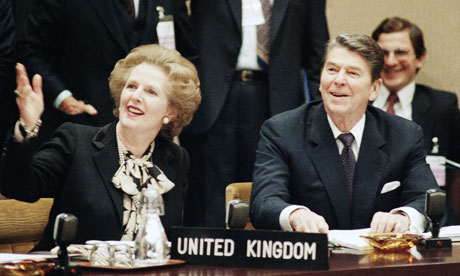
All politics, as they say, is personal. Yet it's only when you read the memoirs or diary entries of the protagonists that you realise just how personal, and how arbitrary, are the great actions of state. Many of the momentous decisions taken by Ronald Reagan and Margaret Thatcher could easily have been different were it not for the odd hissy fit or word in the ear.
Richard Aldous's account of the most intriguing Anglo-American double act of them all provides many surprises. The historical record surely seemed unequivocal? As one diplomat recalled to me at the time, Ronnie and Maggie might as well have been making love on the lawn. Here were two disciples of Milton Friedman determined to let capitalism rip and hasten the demise of communism. And yet this, according to the author, is one of the great myths of our time. Instead, president and prime minister were at each other's throats. She would handbag him; he would cower or smile and then go behind her back. The list of arguments is long, reaching fever pitch over the Falklands, the invasion of Grenada, and Reagan's pet, the Strategic Defence Initiative (his plan for a space-based missile defence system).
In 1982, as Thatcher sent her mini-armada to the South Atlantic, Washington was reluctant to help. Aldous describes in compelling detail how the Americans saw the campaign as a fit of post-colonial hubris. According to a White House official it was "Gilbert and Sullivan as told to Anthony Trollope by Alistair Cooke".
The baddie for the Brits was Jeane Kirkpatrick, the US ambassador to the UN and a pugilist out of Thatcherite central casting. Kirkpatrick talked of US "hemispheric" (aka backyard) priorities. The goodie was Anglophile defence secretary Caspar Weinberger. The slippery man in the middle was secretary of state Al Haig, who told staff "It's getting hairy, fellas". As for Reagan, he just wanted to be rid of the problem and watch movies. Thatcher harangued him, telling him to get off the fence. The more she shouted, the more he sought reasons to avoid her. But he eventually delivered.
The roles were reversed the following year when the Americans invaded another small island, Grenada, a member of the Commonwealth that had had the temerity to find itself with a left-wing government. In an astonishing passage, Aldous quotes Thatcher as telling the Irish premier: "The Americans are worse than the Soviets… persuading the governor [of Grenada] to issue a retrospective invitation to invade after they had taken him aboard an American warship". Bizarrely, Reagan found himself briefly best buddies with President Mitterrand, who – to Thatcher's fury – declared that America could count on France for support.
For all her hectoring, Thatcher regarded access to the president as essential. She would stop at nothing, such as a trip halfway round the world, from Beijing to Washington, just for a couple of hours with him. His visits to the UK were nothing like as frequent.
There is no shortage of biographies of Thatcher or Reagan. They draw on similar material, from the president's own diaries to those of British politicians such as Alan Clark. What Aldous manages to achieve is strong research with a vivid narrative style, bringing the most dramatic moments to life. He describes, almost as if he were standing in the room, how Reagan and Gorbachev, at the Reykjavik summit, nearly agreed to remove both superpowers' nuclear arsenals, only for the deal to founder on one or two whispered words. The bathos is just as striking. When Nancy Reagan went to the wedding of Charles and Diana in London, her husband couldn't concentrate on his work. "I worry when she's out of sight six minutes," he noted in his diary.
Aldous seeks to avoid the easy sloganising that characterises many accounts of this era. His objectivity is commendable, but I wonder if he fails to inject enough context – in the case of Thatcher, her domestic political travails and her messianic monetarist tendencies. Most of all, I remain to be convinced about the basic argument.
The book ends with the demise into old age of these two political titans, via the extravagant praise they heaped on each other in valediction. Could a woman who declared "thank you for your presidency, thank you for your testament of belief" really have been at loggerheads with him for so long? The answer must be yes… and no. They may have argued over many of the big decisions, but they did so in the spirit of a married couple who cannot bear to be either with or without each other.
At least they did fight. This book provides a lesson Tony Blair – that other British prime minister lauded over the sea – never learned. In bending over backwards to keep in with George W Bush, Blair failed that most basic test of diplomacy. "Yo Thatch" is not a phrase Reagan would have dared to utter.
John Kampfner is the author of Blair's Wars and Freedom For Sale.

